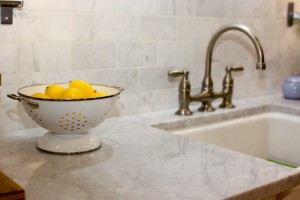Marble countertops are easier to care for than you may think.
 Marble is simply a beautiful stone. White marble in particular is an excellent choice for kitchen countertops. The overall tone of the stone delivers a clean, elegant, bright look while the veining of the stone keeps your white countertops from appearing cold or sterile.
Marble is simply a beautiful stone. White marble in particular is an excellent choice for kitchen countertops. The overall tone of the stone delivers a clean, elegant, bright look while the veining of the stone keeps your white countertops from appearing cold or sterile.
Unfortunately, many people are afraid to get marble kitchen countertops due to various marble myths, such as:
Marble is Expensive
Not all marble is expensive! The cost of a given stone depends on a variety of factors, including availability and demand. For example, one luxury marble, Calacatta marble, is expensive because it is rare and highly sought after for its bright white color and dramatic dark veins. However, Carrara marble looks very similar to Calacatta at a bargain price. Carrara marble is abundant, but it tends to have finer, lighter veins which give the stone a grayer cast. It is also a bit more porous, which means it requires more care and maintenance.
Marble Isn’t Meant to be Used
One common misconception people have about marble is that it is a luxury stone that is not really meant to be used—think marble floors in a king’s palace. However, in reality marble is not just for people who maintain their homes in a perfect, showroom-like state of cleanliness and order. Marble can stand up to hard use, including daily cooking in your kitchen. It’s actually very helpful for baking because the cool surface is ideal for rolling out or kneading dough. The key is you have to know how to clean and care for your marble to keep it looking beautiful.
Marble is High-Maintenance
Now, just because you do have clean and care for marble doesn’t justify its reputation of being high-maintenance. Marble is actually just as easy to clean as any other countertop material, provided it has been sealed to keep stains from penetrating deep down into the stone’s pores. Most messes need just a bit of warm water and dish soap to remove, and any worrisome potential stains can usually be lifted out by leaving a paste of baking soda and water on them overnight. Don’t be afraid of marble because it needs to be sealed—many people find they never need to reseal their countertops after they have been sealed once professionally.
Marble Gets Ruined by Scratches
Marble is a relatively soft stone, and it is vulnerable to scratches as well as to etching from acidic foods and drinks. However, it is not true that one scratch will ruin your marble. If you are concerned about scratches, you should simply choose marble with a honed finish. This type of marble countertop has been sanded to give it a soft, matte look that hides scratches exceptionally well. Countertops with a polished finish, by contrast, show scratches and etch marks more clearly.



Recent Comments